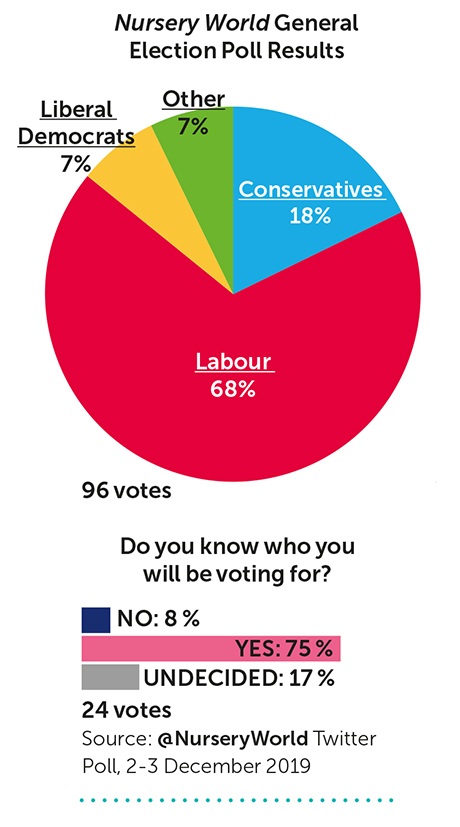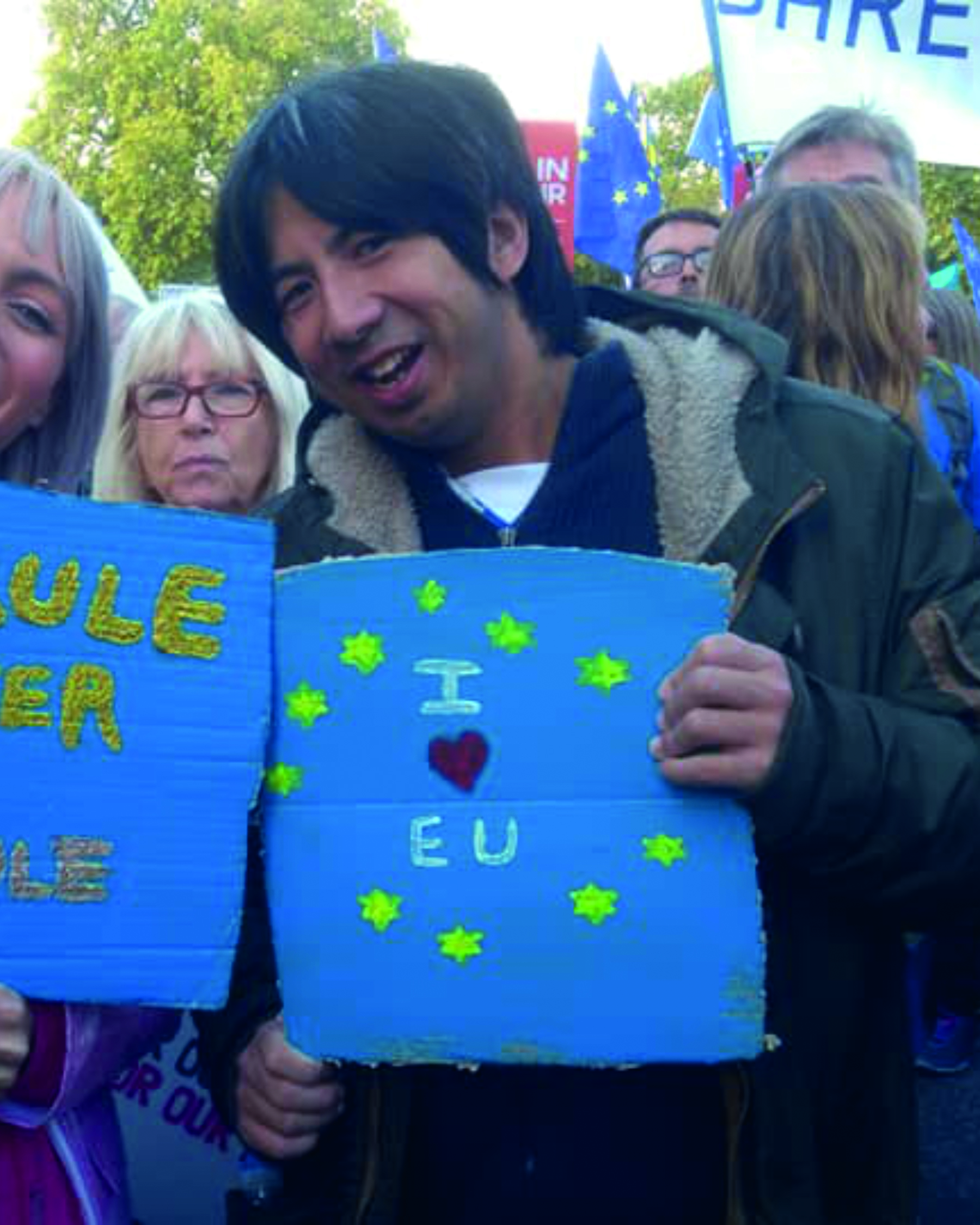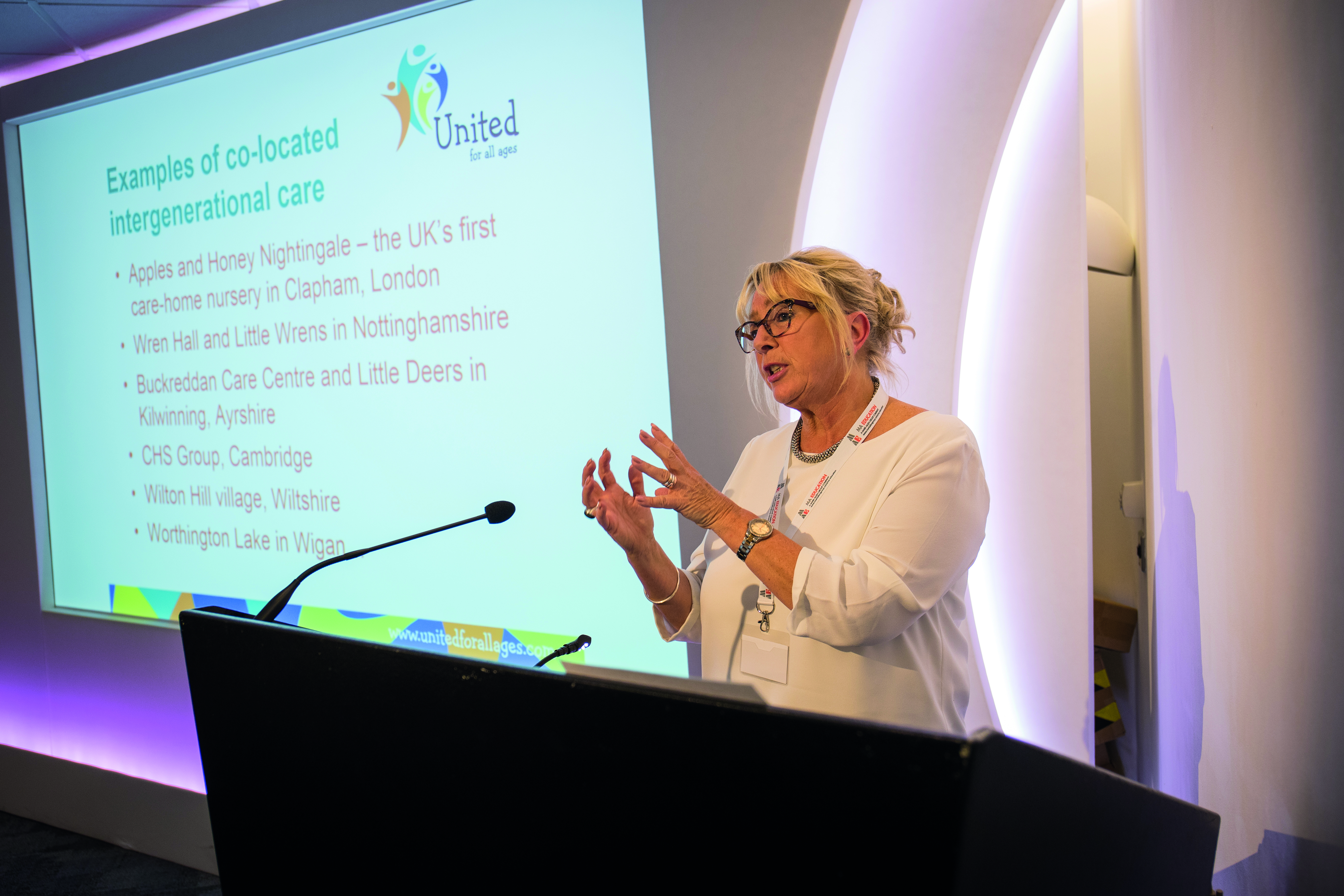
- Readers reveal who they will vote for on 12 December
- Sector largely favouring Labour; some undecided
Ahead of Thursday’s crucial general election, we asked Nursery World readers who they would be voting for and why.
We also carried out two 24-hour polls on Twitter (see charts), which give an interesting snapshot of voter intentions in the sector.
This put Labour ahead with 68 per cent of the vote, followed by the Conservatives on 18 per cent, and the Liberal Democrats and other parties each on 7 per cent. The slant towards Labour among our readers is reflected in the comments we received, with more Labour voters in the sector getting in touch to share their thoughts.
Separately, 25 per cent of respondents to a second Twitter poll had yet to pick a party.

Thanks very much to everyone who took part. Below we share some views from those of you working on the front line in early years education.
Kuen-Wah Cheung, early years professional, Brighton
VOTING: LABOUR


You don’t need to go on a long learning walk to see the damage caused by Tories this decade.
As a sector, we have seen our ideals crushed and our horizons narrowed. Four million children are now in poverty and massive underfunding has brought many nurseries to their knees.
Labour’s plan for much higher funding rates for subsidised places and its rebuilding of Sure Start offer a better future. The suggestion that a Government could possibly improve our lives is so far from reality now that it is often treated with incredulity. This is why Labour’s proposals are sometimes greeted with indifference and cynicism by the very parents and practitioners that would gain most.
Yet I support Jeremy Corbyn with my heart and head. Labour did not cause the global economic crisis, its fully costed plans will only be paid by those who can afford it, and its overall spending is comparable with Germany, Portugal and Italy. People say that Labour is a risk. But if we don’t give change a chance, we risk even more.
Ian Morgan, owner of Little Ducklings Day Nursery in Berkshire and Puddleduck Nursery in Oxfordshire
VOTING: CONSERVATIVES
I have met Angela Rayner [shadow education secretary] and Tracy Brabin [shadow early years minister] and Layla Moran [Liberal Democrat education spokesperson], as well as Government ministers and DfE civil servants.
I know Layla was a teacher and gets it more than most; however, I am not convinced my vote for the Liberal Democrats would not be wasted as I live in a safe Tory seat.
As for Labour, I fear what would happen under their guidance. Their manifesto states they would ‘rapidly’ introduce a £10 minimum wage for 16-plus, but when it comes to funding they state they would increase [this] over their first term. I believe that if the two are not synchronised, my wages bill will increase without an increase in income, which will basically leave me either passing costs on to parents or having to subsidise even further.
Other Labour plans scare me too. The implementation of a ‘National Pay Scale’ will take the control of my workforce away and sounds like a return to the bad old days of Labour. This makes me believe I would be nationalised by proxy!
So I will vote Tory and continue to campaign for the removal of the word ‘free’. I think I stand more chance with a Tory Government.
Cary Rankin, managing director, Bertram Nursery Group
VOTING: LIBERAL DEMOCRATS

Since the EU referendum, it has been really difficult for me to find a preferred political party. This made deciding how to cast my vote particularly challenging.
My decision to vote for the Liberal Democrats is based on what is right for my family and, of course, what is right for the sector and the business I am charged with leading. Personally, I struggle with the main party leaders as appropriate candidates. Trust, integrity and credibility are very important when it comes to leadership and I feel we miss these with the two leading party heads.
The Lib Dems appear to have listened and have set out plans to increase the funding rates accordingly with minimum shortfalls.
National Minimum and Living Wage increases under Labour and Conservatives, while admirable and something we would be very happy to support, must be affordable and managed in a way that allows us to avoid passing costs on to our service users.
On business rates, while Conservatives have committed to a review, there is no further commitment to reduce rates specifically for our sector. On the flip slide, corporation tax under Labour appears to be rising excessively.
Finally, I cannot stand behind Labour’s commitment to introduce Sure Start Plus centres, primarily given the impact this will likely have on private providers. We should all recall the demise of Sure Start centres across the country due to them being unaffordable, meaning large numbers were tendered out in later years or, at worst, closed.
The one thing I would encourage everyone to do is vote. Please don’t waste your vote.
(My views do not necessarily represent the views of Bertram.)
Denise Burke, early years and childcare consultant, Norfolk
VOTING: UNDECIDED





As someone who has always been politically active and, indeed, stood as a parliamentary candidate in 2015, I now feel politically homeless and reluctant to vote for any party at the forthcoming general election.
I have no confidence in any of the main party leaders and find it quite astonishing that all three appear to be trying to ‘outdo each other’ with their childcare offers. Promising additional hours for two-, three- and four-year-olds is a voting carrot for parents but also a poisoned chalice for childcare providers.
What is needed to overhaul childcare funding is some radical thinking; politicians and advisers alike need to speak with the sector rather than assuming that more hours will benefit both childcare and parents.
It’s completely unacceptable that political parties can abuse the goodwill of childcare providers again and again, rather than promising to fund good-quality early years and childcare, which will have a greater impact on our young children.
Diana André, pre-school manager at Happy Faces Preschool in Haverhill, Suffolk
VOTING: LABOUR


I will be voting Labour because I do think it’s time for change. I have found managing an early years setting in the last few years challenging. The cuts have had an impact, with speech and language services being reduced, less SEND support and parents reporting barely seeing a health visitor.
Sure Start centres have also closed down and it hasn’t felt like the early years of a child’s life have been valued.
On top of that, the poor funding rate that settings are given has made it difficult to offer the level of care and education we want, as well as be able to pay staff a good wage.
Labour’s proposals to reverse the cuts, provide properly funded 30 hours of childcare for all and support the sector to access good-quality training are excellent. But also I believe early years staff, who are often well-qualified and experienced, deserve to be paid well.
For too long this predominantly female workforce has had its pay suppressed – Labour want to change this. Crucially, Labour have said they will increase funding and give that funding directly to us, the providers. I will be voting for investment in families, children and the early years sector.
Medusa Sojourn, owner of Ducklings Nursery in Sutton Coldfield and Ducklings, Nottingham
VOTING: LABOUR

Despite the slightly higher personal tax bill, it’s time to practise what we preach.
Democracy, sharing fairly, understanding how our behaviour impacts other people and noticing changes in our environment are things we teach our three- to four-year-olds but seem to fly over the heads of the Conservative Government.
The needs of the people we work with, such as further education, shorter working hours, better wages, access to a robust NHS and genuinely sustainable funding for the green revolution, education and early years, have been minimised for the last decade.
We’ve managed to ‘hygge’ our settings, now it’s time to hygge our governments by pursuing a commitment to equality on moral and economic grounds.









